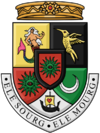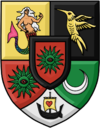Prime Minister of Sabia and Verona
| Prime Minister of Sabia and Verona | |
|---|---|
 | |
| Style | kuragikuragán Mr. Prime Minister |
| Residence | Gaovesiħrét, Bartolucci 100, Alios |
| Appointer | Tarik of Kârjasary |
| Term length | No term limit Elections to Parliament are held once every year. |
| Inaugural holder | Pomme Gauvier |
| Formation | 18 October 2012 |
| Deputy | Deputy Prime Minister |
| Salary | SVG 10.000 |
| Website | siv-gov.webs.com |
| Sabia and Verona |
| This article is part of the series |
| Politics and government of Sabia and Verona |
| Constitution |
|---|
| Supreme Court |
| Electoral Commission |
| Foreign relations |
| History |
The Chief of Government of Sabia and Verona (in Sabian kuragikurág, [kurɑɡikuˈrɑɡː]), commonly referred to in English as the Prime Minister is the head of government of the Kingdom of Sabia and Verona. The office of the Chief of Government has existed since the Kingdom's creation in 2012, and its present powers and duties were determined by the Constitution of 2017.
The Prime Minister is a Member of Parliament who, after being given a mandate by the King, presents a proposal of Government to Parliament. Since the adoption of the Constitution of 2015, the Prime Minister has typically been the leader of the largest party or coalition of parties in Parliament. The officeholder decides the number of Ministries the Government will have and is legally responsible for the Government's actions. If a Prime Minister resigns or is censored through a motion of no confidence, their Government automatically resigns with them.
The current Prime Minister is Apollo Cerwyn of the Democratic Party, whose government was approved by the Fifth Parliament of Sabia and Verona, elected in 2019.
Role
The role of the Chief of Government has changed over the course of Sabioveronese history. Although Sabia and Verona has always been de jure a parliamentary democracy, for a long time the Prime Minister held a more active role in the Kingdom's politics than the Prime Ministers of other parliamentary monarchies. Until 2015, the PM did not have to be a member of the legislature nor the leader of their party, and elections were held separately for the PM and for the members of the Courts. The social attitude towards the office of the head of government has also always been more reminiscent of the presidential model in place in most macronations that have had an influence on Sabia and Verona, such as the neighbouring Venezuela and Argentina.
Presently, the political power of the Prime Minister has been considerably moderated with the adoption of new constitutions, namely the 2015 and 2017 constitutions, but the general public's perception of the head of government remains similar to that of a head of state in presidential democracies. The Constitution of 2017 defines the role of the Prime Minister in title V (On the Government), which encompasses articles 46 to 54.
History
The office was created on 18 October 2012, by the Courts of Sabia and Verona in its first meeting in Salisse (then known as the Saint Enric). The Prime Minister was intended to be the nation's primary leader and head of government alongside the Governor, who represented the authority of the King of Juclandia in Sabia and Verona while the Prime Minister represented the Sabioveronese people (the Governor was chosen by the Juclandian monarch while the chief of government was elected by Sabia and Verona's people). Technically, the first person to hold the office was Pomme-Gabrielle Gauvier, a member of the Courts who was appointed to act as chief of government and to chair the meeting. At the end of the meeting, Napoléon Bleuberrie was elected as official Prime Minister.
The first democratically elected Prime Minister was Osez Kóvérsz, who entered office in January 2013 after being elected at the 2012 election.[1] After finishing a mandatory six-month term, Bleuberrie was again elected for a second term after Kóvérsz's term ended, however he only lasted two months in office after being demoted from his position after his failed self-coup attempt on 25 July 2013.[2] Following this, Air Force General Rubén D. Hernández was provisionally chosen to act as Prime Minister until October 2013 when Ann Stefanović became Prime Minister after winning the September 2013 election.[2][3]
Stefanović and her successor, Léon Galieri, completed their respective six-month terms. Galieri oversaw the adoption of a new constitution under the new Queen of Sabia and Verona, Isadora of Annenak, who was elected by the Sabioveronese people after the creation of the Federal Union of Juclandian Lands.[4] The new constitution redefined the role of the Prime Minister: the officeholder was now the official representative of the provincial citizenry, the stuffed animals of the Kingdom.
Galieri's successor, Bertrand Rivière (elected at the September 2014 election), extended the Prime Minister's term length to a year, and amended the constitution to make the use of the word Sabian Enkâkourak official in all languages, replacing the more common use of the term "First Secretary" in English.[5] Since the Great Sabian Reform of 2017, the term "Prime Minister" is of widespread use, instead of the Sabian kuragikurág and the official "Chief of Government".
List of office-holders
-
Napoléon Bleuberrie
1st and 3rd governments
Oct 2012—Jan 2013
Jun 2013—Jul 2013 -
Osez Kóvérsz
2nd government
Jan 2013—Jun 2013 -
Rubén D. Hernández
Caretaker government
Jul 2013—Oct 2013 -
Ann Stefanović
4th government
Oct 2013—Apr 2014 -
Léon Jens-Galieri
5th government
Apr 2014—Oct 2014
Aug 2015—Oct 2015 -
Bertrand Rivière
6th government
Oct 2014—Aug 2015 -
Shounn Virny
7th and 8th governments
Oct 2015—May 2017 -
Noa Dargany
9th and 10th governments
May 2017—October 2018 -
Andrew Blackhorse
11th government
October 2018—June 2019 -
Apollo Cerwyn
12th government
June 2019—present
See also
- Monarchy of Sabia and Verona
- Government of Sabia and Verona
- List of political parties in Sabia and Verona
- Parliament of Sabia and Verona
References
- ↑ "Elections 2012: Unity Party for the win". The SiV Phonograph. 12 December 2012. Retrieved 24 May 2017.
- ↑ 2.0 2.1 "Failed self-coup attempt: the end of Bleuberrie". The SiV Phonograph. 25 July 2013. Retrieved 24 May 2017.
- ↑ "Stefanović wins the race". The SiV Phonograph. 15 September 2013. Retrieved 24 May 2017.
- ↑ "Left Alliance wins the election". The SiV Phonograph. 20 March 2014. Retrieved 24 May 2017.
- ↑ "Dreaming big: The Aishayerovê and the beginning of a new era". The SiV Phonograph. 1 October 2015. Retrieved 24 May 2017.












